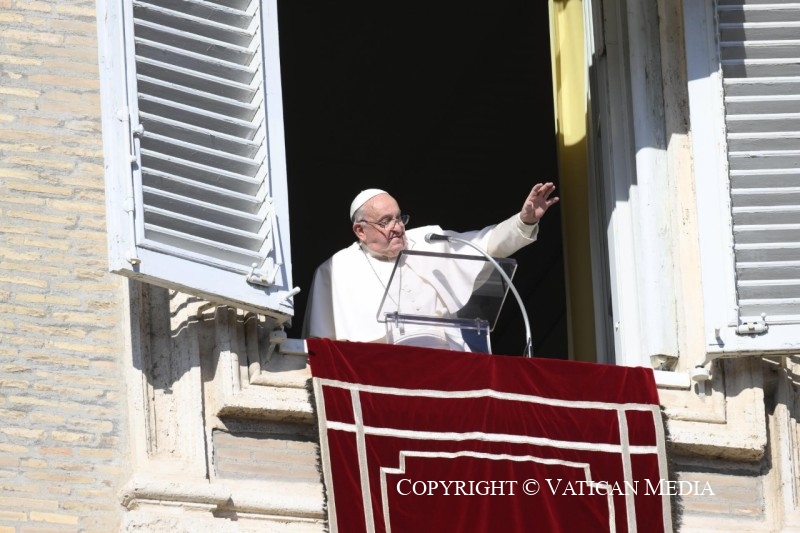Pained by events in Palestine and Israel, Pope urges ‘negotiations for an immediate ceasefire'
At the Angelus, Francis called on the parties to reach an "immediate ceasefire" and release the hostages. He also urged “safe access" to humanitarian aid. On disarmament, he says that “it is a duty" that requires the courage for the entire “family of nations”.
Vatican City (AsiaNews) – Every day Pope Francis carries a burden "in his heart", that of the "suffering of the populations in Palestine and Israel".
For their sake, after the recitation of the Angelus, the Holy Father today, the Third Sunday of Lent, spoke words to encourage the parties to negotiate an "immediate ceasefire”.
Sorrow is the leitmotif of his address, inner pain that reflects the aching caused by the lack of peace and the "thousands of dead, injured, displaced", as well as the "immense destruction".
More than 30,000 people have been killed in the Gaza Strip, according to the Hamas-run Health Ministry.
The ongoing hostilities are leading to “horrible consequences for children and the defenceless, who see their future compromised," Francis said a day after the Holy See released the Pope’s message to the world’s children in anticipation of the Church’s first-ever World Children’s Day, set for in Rome on 25-26 May.
Speaking to the crowd from the window of the Apostolic Palace, the pontiff asked: "Do you really think you can build a better world in this way?” and “Do you really think you can achieve peace?”
“Enough, please!” he said, “Let us all say: enough, please!” which sparked a long applause from a crowded and windswept St Peter's Square.
As he has done on other occasions, Francis urged the parties to work harder on negotiations "so that the hostages can be immediately freed,” adding, “Let them return to their loved ones who are anxiously waiting for them.”
Francis also reiterated the urgency for the civilian population to have "safe access" to "needed and urgent" humanitarian aid. The appeal follows the death last Thursday of 115 people near a humanitarian convoy in Gaza City.
"How many resources are being wasted on military spending, which due to the current situation sadly continues to increase,” the pontiff said.
With these words, Francis also mentioned the second International Day for Disarmament and Non-Proliferation Awareness, two days from now, expressing hope that the international community "will understand that disarmament is, first of all, a duty, [. . .] a moral duty.”
Indeed, “Let us put this in our heads. This requires courage on the part of all the members of the great family of nations."
Such courage can lead us to "move from the balance of fear to the balance of trust,” the pope explained. “There is so much pain," he noted, even in "tormented Ukraine," which should not be forgotten. Here, too, "many people die every day," he lamented.
At the end of his address, the Holy Father offered an "affectionate greeting" to the young Ukrainians invited by the Community of Sant'Egidio – whose flags were visible in St Peter’s Square – on the theme "Overcome evil with good. Prayer, the poor, peace."
"Dear young people, thank you for your commitment to those who suffer most from war," he said.
Prior to the Marian prayer, Pope Francis spoke about today's Gospel (Jn 2:13-25), in which an “angry” Jesus “does not accept that the temple-cum-marketplace replace the temple-cum-home, where the relationship with God is distant and commercial rather than close and trusting.”
In this episode, Jesus drives the merchants out of the temple, admonishing those he meets to “stop making my Father’s house a marketplace” (v. 6). Instead, the pontiff compares “home and market”, saying that they are two different ways "of placing oneself before the Lord.”
When the temple is seen as a market, all one needs to do is “buy a lamb, pay for it, and eat it." When, conversely, it is treated like a home, the "opposite" happens: “We go to meet the Lord, to be united with Him, and with our brothers and sisters.”
The main difference between the two ways is that "at the market, one looks out for one’s interests, while at home, one freely gives.” If one treats the house of God as a market, "a barrier is created between God and man and between brothers.”
With such thoughts in mind, the pope urged the faithful in this season of Lent to “Make in us and around us more home and less market.”
The first way to do this is by praying "to God”; that is, “praying a lot, as children who tirelessly knock trustingly at the door of the Father, not as greedy and distrustful merchants”.
The second is by "spreading brotherhood", which is much needed. "Think of the awkward, isolating, sometimes even hostile silence that one encounters in so many places.”







.png)










